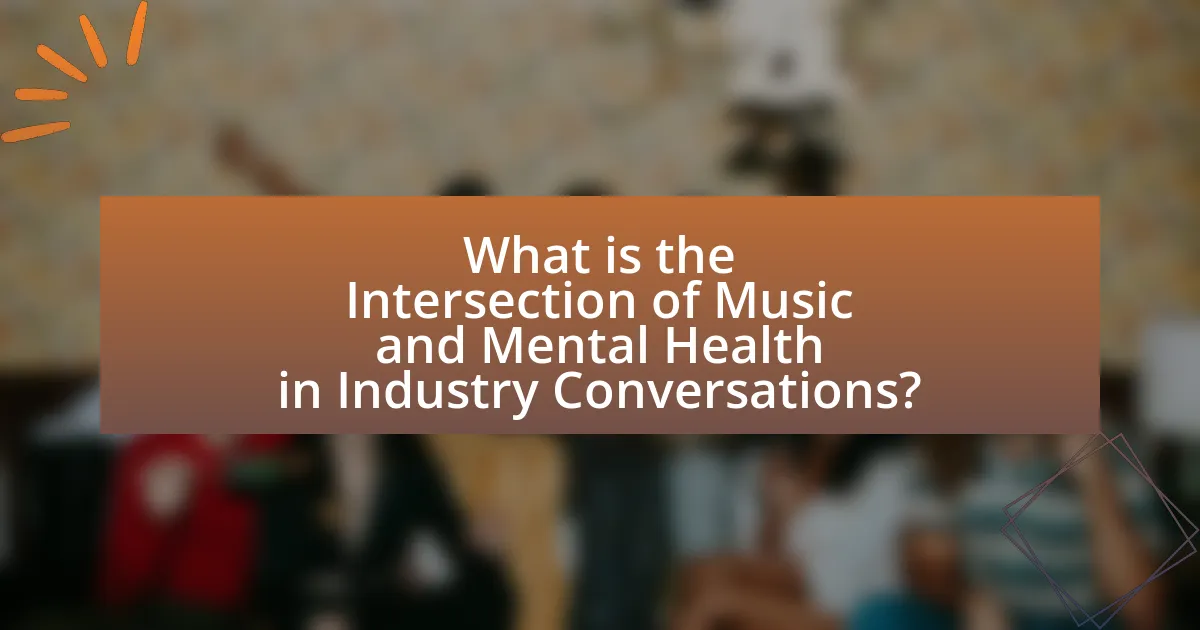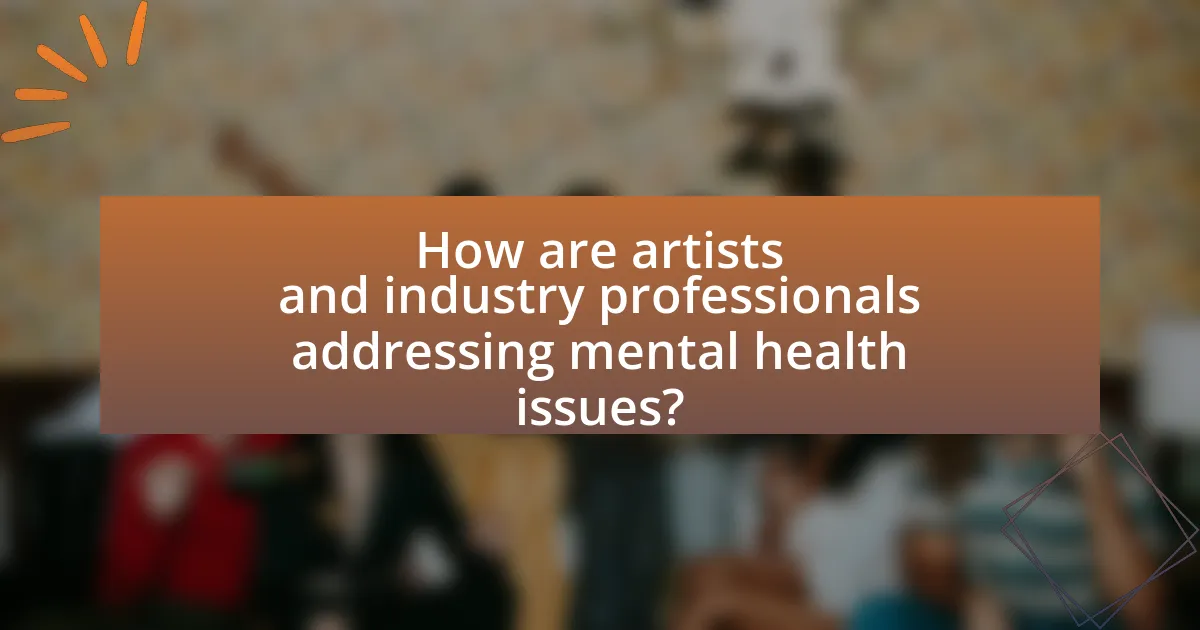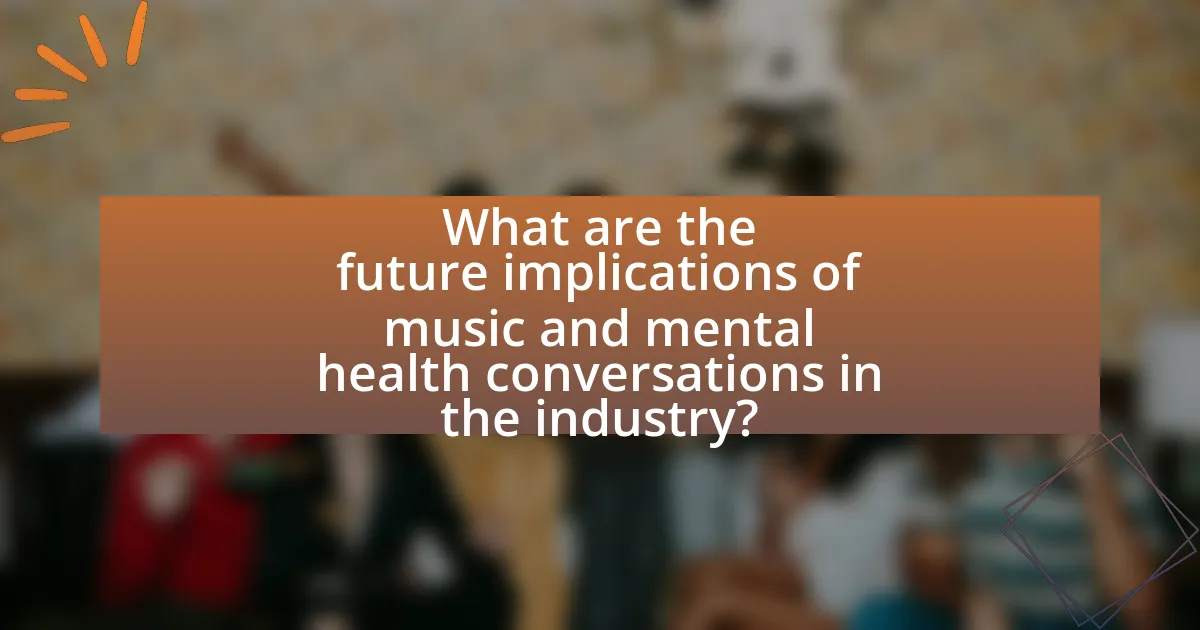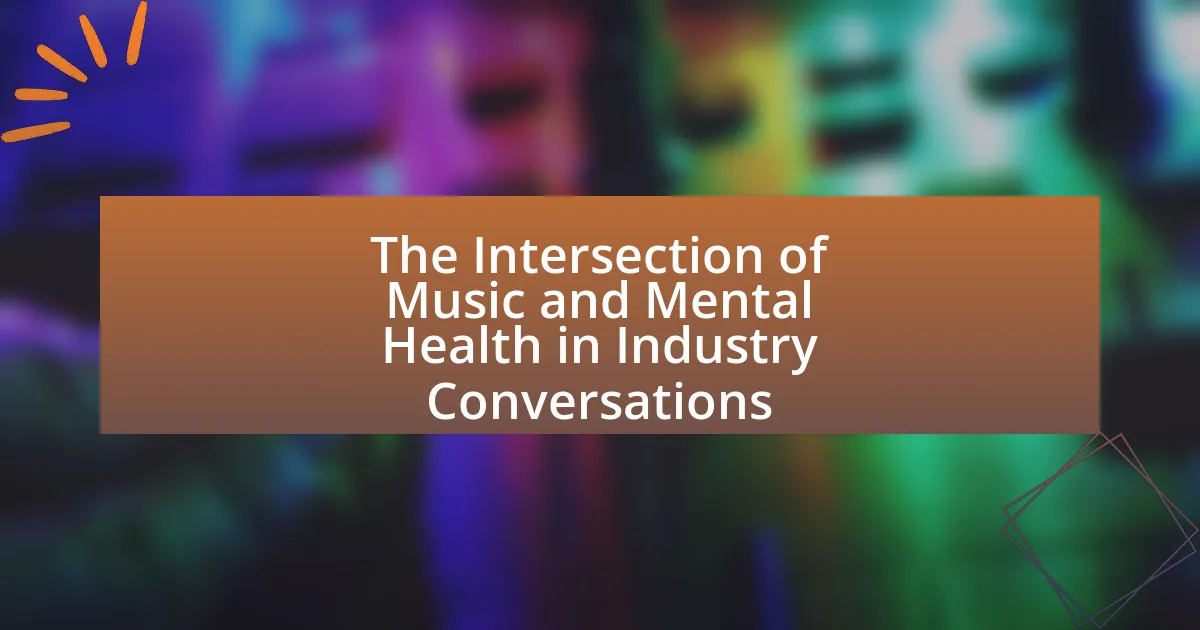The article examines the intersection of music and mental health within industry conversations, emphasizing the therapeutic benefits of music and its role in promoting mental well-being. It highlights research indicating that music therapy can alleviate symptoms of anxiety and depression, while also addressing the mental health challenges faced by music professionals due to the industry’s high-pressure environment. The discussion includes the evolution of stigma surrounding mental health, the importance of open dialogue, and various initiatives aimed at supporting mental health awareness in the music industry. Additionally, it explores how technology and data analytics can enhance mental health resources for artists, ultimately advocating for a more supportive environment within the industry.

What is the Intersection of Music and Mental Health in Industry Conversations?
The intersection of music and mental health in industry conversations highlights the growing recognition of music’s therapeutic benefits and its role in promoting mental well-being. Industry discussions increasingly focus on how music can serve as a tool for emotional expression, coping mechanisms, and community building, particularly in the context of mental health awareness campaigns. Research indicates that music therapy can reduce symptoms of anxiety and depression, with studies showing that 90% of participants in music therapy reported improved mood and emotional well-being. This evidence underscores the importance of integrating mental health considerations into music industry practices, fostering environments that support artists and audiences alike in addressing mental health challenges.
How does music influence mental health in the industry?
Music significantly influences mental health in the industry by serving as both a therapeutic tool and a source of stress. Research indicates that engaging with music can reduce symptoms of anxiety and depression, as evidenced by a study published in the Journal of Music Therapy, which found that music interventions led to significant improvements in mental health outcomes for participants. Conversely, the high-pressure environment of the music industry can exacerbate mental health issues, with artists often facing stress, burnout, and substance abuse. A survey conducted by the Music Industry Research Association revealed that 73% of musicians reported experiencing mental health challenges, highlighting the dual impact of music on mental well-being within the industry.
What psychological effects does music have on individuals?
Music has significant psychological effects on individuals, influencing emotions, cognition, and behavior. Research indicates that music can enhance mood, reduce anxiety, and improve overall mental well-being. For instance, a study published in the Journal of Positive Psychology found that participants who engaged with uplifting music reported increased happiness and decreased feelings of sadness. Additionally, music therapy has been shown to aid in the treatment of depression and PTSD, demonstrating its therapeutic potential. The American Psychological Association highlights that listening to music can stimulate the release of dopamine, a neurotransmitter associated with pleasure and reward, further supporting its positive psychological impact.
How do different genres of music impact mental well-being?
Different genres of music significantly impact mental well-being by influencing emotions, stress levels, and cognitive functions. For instance, studies have shown that classical music can reduce anxiety and improve mood, while upbeat genres like pop and dance music can enhance feelings of happiness and motivation. Research published in the Journal of Music Therapy indicates that listening to music can lead to a decrease in cortisol levels, a hormone associated with stress, thereby promoting relaxation and emotional stability. Additionally, genres such as jazz and blues have been found to facilitate emotional expression and processing, which can be therapeutic for individuals dealing with depression or grief. Overall, the specific characteristics of each genre, including tempo, rhythm, and lyrical content, play a crucial role in shaping their effects on mental health.
Why is mental health a critical topic in the music industry?
Mental health is a critical topic in the music industry due to the high levels of stress, pressure, and scrutiny faced by artists and professionals. The music industry often demands long hours, constant travel, and public exposure, which can lead to anxiety, depression, and substance abuse. According to a 2019 study published by Help Musicians UK, 71% of musicians experience anxiety, and 68% face depression, highlighting the urgent need for mental health support within this community. This data underscores the importance of addressing mental health to foster a healthier environment for those in the industry.
What are the common mental health challenges faced by music professionals?
Music professionals commonly face mental health challenges such as anxiety, depression, and substance abuse. These issues often stem from the high-pressure environment of the music industry, which includes irregular work hours, financial instability, and public scrutiny. Research indicates that musicians are at a higher risk for mental health disorders compared to the general population, with studies showing that up to 70% of musicians experience anxiety and depression. Additionally, the prevalence of substance use disorders is notably higher among music professionals, with many using drugs or alcohol as coping mechanisms for stress and emotional turmoil.
How has the stigma around mental health evolved in the music industry?
The stigma around mental health in the music industry has significantly decreased over the past two decades. Historically, artists faced immense pressure to conform to a “tough” persona, often leading to silence about mental health struggles. However, recent years have seen a shift, with prominent musicians like Lady Gaga and Logic openly discussing their mental health challenges, which has encouraged others to share their experiences. This change is supported by initiatives such as the “Time to Change” campaign in the UK, which aims to reduce stigma and promote mental health awareness. Additionally, the rise of social media has provided a platform for artists to connect with fans and advocate for mental health, further normalizing these conversations within the industry.
What role do industry conversations play in addressing mental health?
Industry conversations play a crucial role in addressing mental health by fostering awareness, reducing stigma, and promoting resources for support. These discussions create a platform for sharing experiences and best practices, which can lead to improved mental health policies and initiatives within organizations. For instance, the Music Industry Mental Health Fund was established to provide resources and support for mental health issues specifically within the music industry, highlighting the importance of collaborative dialogue in tackling these challenges.
How can open discussions about mental health benefit artists and professionals?
Open discussions about mental health can significantly benefit artists and professionals by fostering a supportive environment that encourages vulnerability and connection. This openness reduces stigma, allowing individuals to share their experiences and seek help without fear of judgment. Research indicates that 73% of musicians experience mental health issues, highlighting the necessity for dialogue in the industry. By addressing mental health openly, artists can improve their well-being, enhance creativity, and build stronger professional networks, ultimately leading to a healthier and more productive work environment.
What initiatives exist to promote mental health awareness in the music industry?
Initiatives promoting mental health awareness in the music industry include the Music Industry Mental Health Coalition, which aims to raise awareness and provide resources for mental health support. Additionally, organizations like Help Musicians UK offer mental health services and funding for musicians in need. The “Mind Your Music” campaign, launched by various artists, focuses on destigmatizing mental health issues within the industry. These initiatives are supported by statistics indicating that musicians are at a higher risk for mental health issues, with a 2019 survey by Help Musicians UK revealing that 71% of musicians have experienced anxiety or depression.

How are artists and industry professionals addressing mental health issues?
Artists and industry professionals are addressing mental health issues by implementing initiatives that promote awareness, provide support, and foster open conversations. For instance, organizations like MusiCares offer mental health resources and financial assistance to musicians in need, while campaigns such as #MentalHealthAwareness encourage artists to share their personal experiences with mental health challenges. Additionally, many artists are collaborating with mental health organizations to create programs that educate their peers and fans about mental well-being. Research indicates that 73% of musicians have experienced mental health issues, highlighting the urgency for these initiatives.
What strategies are being implemented to support mental health in music?
Strategies being implemented to support mental health in music include the establishment of mental health resources, peer support networks, and wellness initiatives within the industry. Organizations such as Help Musicians UK provide mental health support services, including counseling and workshops tailored for musicians. Additionally, initiatives like the Music Industry Mental Health Taskforce aim to raise awareness and promote mental well-being through training and resources for industry professionals. Research indicates that musicians face higher rates of mental health issues, emphasizing the need for these targeted strategies to foster a healthier environment in the music industry.
How do support networks and resources help music professionals?
Support networks and resources significantly aid music professionals by providing emotional, financial, and logistical support. These networks foster connections among artists, industry experts, and mental health professionals, which can lead to collaborative opportunities and shared experiences that enhance resilience. For instance, organizations like Music Support offer mental health resources specifically tailored for those in the music industry, addressing the unique pressures they face. Research indicates that musicians are at a higher risk for mental health issues, and access to these support systems can reduce feelings of isolation and promote well-being, ultimately leading to improved creativity and productivity.
What role do music organizations play in mental health advocacy?
Music organizations play a crucial role in mental health advocacy by raising awareness, providing resources, and fostering community support. These organizations often host events, campaigns, and workshops that educate both artists and audiences about mental health issues, thereby reducing stigma. For instance, initiatives like MusiCares, which is part of the Recording Academy, offer mental health services and support specifically tailored for musicians, demonstrating a commitment to the well-being of individuals in the music industry. Additionally, studies have shown that music can be a therapeutic tool, with organizations promoting its use in mental health treatment, further solidifying their advocacy efforts.
How can music therapy contribute to mental health recovery?
Music therapy can significantly contribute to mental health recovery by facilitating emotional expression and reducing symptoms of anxiety and depression. Research indicates that engaging with music can enhance mood, improve cognitive function, and foster social connections. For instance, a study published in the Journal of Music Therapy found that participants who underwent music therapy showed a 50% reduction in anxiety levels compared to those who did not receive such intervention. Additionally, music therapy has been shown to promote relaxation and improve overall well-being, making it a valuable tool in therapeutic settings for individuals facing mental health challenges.
What are the benefits of music therapy for mental health?
Music therapy provides numerous benefits for mental health, including reduced anxiety, improved mood, and enhanced emotional expression. Research indicates that music therapy can lower levels of cortisol, a stress hormone, thereby alleviating symptoms of anxiety and depression. A study published in the Journal of Music Therapy found that participants who engaged in music therapy reported significant reductions in anxiety and depression scores compared to those who did not participate. Additionally, music therapy facilitates emotional expression, allowing individuals to communicate feelings that may be difficult to articulate verbally, which can lead to improved emotional well-being.
How is music therapy being integrated into treatment programs?
Music therapy is being integrated into treatment programs through structured interventions that utilize music to address emotional, cognitive, and social needs of patients. Various healthcare settings, including hospitals, rehabilitation centers, and mental health facilities, are incorporating music therapy as a complementary approach to traditional therapies. Research indicates that music therapy can enhance patient engagement, reduce anxiety, and improve overall treatment outcomes, as evidenced by studies showing significant improvements in mental health conditions such as depression and PTSD when music therapy is included in treatment plans.

What are the future implications of music and mental health conversations in the industry?
The future implications of music and mental health conversations in the industry include increased awareness and integration of mental health support within music platforms and artist management. As artists openly discuss their mental health struggles, the industry is likely to adopt more comprehensive mental health resources, such as counseling services and wellness programs, to support artists and their teams. This shift is evidenced by initiatives like the Music Industry Mental Health Coalition, which aims to promote mental health awareness and provide resources, reflecting a growing recognition of the importance of mental well-being in creative fields. Furthermore, the incorporation of mental health themes in music can foster a more empathetic audience, leading to a cultural shift that prioritizes mental health discussions, ultimately reducing stigma and encouraging open dialogue.
How can technology enhance mental health support in the music industry?
Technology can enhance mental health support in the music industry by providing accessible resources, fostering community connections, and offering data-driven insights. Digital platforms, such as mental health apps and online therapy services, allow musicians to access support anytime, reducing barriers to care. For instance, a study by the American Psychological Association found that teletherapy can be as effective as in-person therapy, which is crucial for artists who often travel. Additionally, social media and online forums create spaces for musicians to share experiences and support one another, promoting a sense of belonging. Furthermore, data analytics can identify trends in mental health issues within the industry, enabling targeted interventions and resources.
What digital platforms are emerging to address mental health issues?
Digital platforms such as Talkspace, BetterHelp, and Headspace are emerging to address mental health issues. Talkspace and BetterHelp provide online therapy services that connect users with licensed therapists through text, audio, or video sessions, catering to the growing demand for accessible mental health care. Headspace offers mindfulness and meditation resources aimed at reducing stress and anxiety, reflecting a shift towards preventative mental health strategies. These platforms have gained traction, with Talkspace reporting over 1 million users and BetterHelp serving more than 2 million clients, demonstrating their effectiveness and popularity in the mental health landscape.
How can data analytics improve mental health resources for artists?
Data analytics can improve mental health resources for artists by identifying trends and patterns in their mental health needs through data collection and analysis. By utilizing surveys, social media sentiment analysis, and usage statistics from mental health apps, organizations can gain insights into the specific challenges artists face, such as stress, anxiety, and burnout. For instance, a study by the Music Industry Research Association found that 73% of musicians experience anxiety, highlighting the need for targeted mental health interventions. This data-driven approach allows for the development of tailored resources and support systems that address the unique mental health challenges within the artistic community, ultimately leading to more effective and accessible mental health care for artists.
What best practices can be adopted for promoting mental health in music?
Best practices for promoting mental health in music include fostering open communication, providing mental health resources, and creating supportive environments. Open communication encourages artists and industry professionals to share their experiences and challenges, reducing stigma around mental health issues. Providing mental health resources, such as access to counseling and workshops, equips individuals with tools to manage stress and anxiety effectively. Creating supportive environments involves implementing policies that prioritize well-being, such as flexible schedules and mental health days, which can significantly enhance overall mental health in the music industry. These practices are supported by research indicating that supportive work environments lead to improved mental health outcomes and increased job satisfaction among musicians and industry workers.
How can artists create a supportive environment for mental health?
Artists can create a supportive environment for mental health by fostering open communication and collaboration within their communities. By encouraging dialogue about mental health challenges and sharing personal experiences, artists can reduce stigma and promote understanding. Research indicates that supportive social networks significantly enhance mental well-being, as highlighted in a study published in the Journal of Affective Disorders, which found that social support is linked to lower levels of depression and anxiety. Additionally, artists can organize workshops and events focused on mental health awareness, providing resources and creating safe spaces for individuals to express their feelings. This proactive approach not only benefits the artists themselves but also cultivates a culture of empathy and support among their audiences and peers.
What steps can industry leaders take to prioritize mental health initiatives?
Industry leaders can prioritize mental health initiatives by implementing comprehensive wellness programs that include mental health resources, training for managers, and creating a supportive workplace culture. Research indicates that organizations with strong mental health support see a 30% reduction in employee absenteeism and a 25% increase in productivity. Additionally, leaders should regularly assess employee mental health needs through surveys and feedback mechanisms, ensuring that initiatives are tailored to the workforce. By fostering open communication about mental health and providing access to professional support, industry leaders can significantly enhance employee well-being and overall organizational performance.
